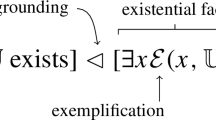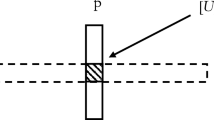Abstract
The current interest in the notions of ontological dependence and metaphysical grounding is usually associated with a renewal of interest in Aristotelian metaphysics. Curiously, some authors have recently argued that the Aristotelian view of universals, according to which universals depend for their existence on their exemplifiers, is incoherent from a grounding perspective. In this paper I argue that such criticism is misleading. I shall examine their arguments and clarify the supposed incoherence.
Similar content being viewed by others
Notes
To avoid misunderstandings, let me stress one point: A creation relation is not a superinternal relation. When R in aRb is superinternal, b and R are both grounded in a. When R in aRb is a creation relation, b is grounded in ‘its being in the R relation to a’. Neither the Tractatus nor the writing relation are grounded in Wittgenstein. Rather, the (existence of the) Tractatus is grounded in the fact that Wittgenstein wrote it. Similarly, as regards Aristotelianism, it is not the case that both the facts of exemplification and the universals included in such facts are grounded in objects. Universals alone are grounded in facts of exemplification. If a is contingently F, then neither does a ground F, nor does a ground the exemplification fact (that a is F). Instead, the fact that a is (contingently) F grounds the fact that F exists. Thanks to an anonymous referee for comments on this point.
Thanks to an anonymous referee for making this point.
For a detailed discussion of the differences, see Bernstein (2017).
I do not consider the origin essentialism of books plausible, i.e. I believe that in any possible world in which someone writes this book (i.e. the same sequence of sentences), the Tractatus does exist. Anyway, my example does not depend on this controversial point.
For this default view, according to which grounding is a kind of necessary relation see Audi (2012b), Dasgupta (2014), deRosset (2010), Rosen (2010) and Trogdon (2013). For an exception to this view, see Skiles (2014). It may be noticed that neither Costa nor Alvarado reject the view that grounding is a form of necessitation.
Although some metaphysicians (Schaffer 2009; Jago 2016) claim that grounding is a relation which holds between any kinds of entities, including facts, objects, properties, etc., most of them—Rosen (2010), Fine (2012), Audi (2012a, b), Raven (2012), Cameron (2016) among others—take facts (propositions or similar) as the only adequate relata of grounding links. For a recent discussion about the relation between grounding and dependence, see among others Schnieder (2017) and Rydéhn (2018).
For more reasons to reject the constitutive essential account of dependence (see Koslicki 2013: pp. 55–7).
Alvarado (2019: p. 13) writes: ‘Aristotelianism requires that thin particulars instantiate at least one universal. This requirement can be understood as a ‘generic’ dependence of thin particulars on instantiations, but it is also a case in which instantiations are ‘constitutively sufficient’ for the thin particular –or particulars– involved in the fact.’.
References
Alvarado, J. T. (2019). The grounding problem for aristotelianism (unpublished manuscript).
Alvarado, J. T. (2020). A metaphysics of platonic universals and their instantiations. Springer.
Armstrong, D. M. (1978). Nominalism and realism, volume 1 of universals and scientific realism. Cambridge University Press.
Audi, P. (2012a). A clarification and defence of the notion of grounding. In F. Correia & B. Schnieder (Eds.), Metaphysical grounding: Understanding the structure of reality. Cambridge University Press.
Audi, P. (2012b). Grounding: Toward a theory of the in-virtue-of relation. The Journal of Philosophy, 109(12), 685–711.
Azzouni, J. (2012). Simple metaphysics and ‘ontological dependence.’ In F. Correia & B. Schnieder (Eds.), Metaphysical grounding: Understanding the structure of reality (pp. 234–253). Cambridge University Press.
Bennett, K. (2011). By our bootstraps. Philosophical Perspectives, 25, 27–41.
Bernstein, A. (2017). Grounding is not causation. Philosophical Perspectives, 30, 21–38.
Cameron, R. (2014). ss. In A. Cotnoir & D. Baxter (Eds.), Composition as Identity (pp. 90–110). Oxford University Press.
Cameron, R. P. (2016). Do we need grounding? Inquiry, 59(4), 382–397.
Correia, F. (2005). Existential dependence and cognate notions. Philosophia Verlag.
Correia, F., & Schnieder, B. (2012). Metaphysical grounding: Understanding the structure of reality. Cambridge University Press.
Costa, D. (2019). An argument against Aristotelian Universals. Synthese. https://doi.org/10.1007/s11229-019-02345-z
Dasgupta, S. (2014). On the plurality of grounds. Philosophers’ Imprint, 14, 1–28.
deRosset, L. (2010). Getting priority straight. Philosophical Studies, 149, 73–97.
Fine, K. (1994). Essence and modality. Philosophical Perspectives, 8, 1–16.
Fine, K. (2012). Guide to ground. In F. Correia & B. Schnieder (Eds.), Metaphysical grounding: Understanding the structure of reality. Cambridge University Press.
Galluzzo, G. (2015). A kind farewell to platonism. In G. Galluzzo & M. J. Loux (Eds.), The problem of universals in contemporary philosophy (pp. 85–113). Cambridge University Press.
Galluzzo, G., & Loux, M. J. (Eds.). (2015). The problem of universals in contemporary philosophy. Cambridge University Press.
Jago, M. (2016). Introduction. In M. Jago (Ed.), Reality making. Oxford University Press.
Koslicki, K. (2013). Varieties of ontological dependence. In F. Correia & B. Schnieder (Eds.), Metaphysical grounding: Understanding the structure of reality (pp. 186–213). Cambridge University Press.
Loux, M. (2015). An exercise in constituent ontology. In G. Galluzzo & M. J. Loux (Eds.), The problem of universals in contemporary philosophy (pp. 9–45). Cambridge University Press.
Lowe, E. J. (2006). The four-category ontology. Oxford University Press.
Lowe, E. J. (2015). In defense of substantial universals. In G. Galluzzo & M. J. Loux (Eds.), The problem of universals in contemporary philosophy (pp. 65–84). Cambridge University Press.
Raven, M. (2012). In defense of ground. Australasian Journal of Philosophy, 90, 687–701.
Rosen, G. (2010). Metaphysical dependence: Grounding and reduction. In R. Hale & A. Hoffman (Eds.), Modality: Metaphysics, logic, and epistemology (pp. 109–136). Oxford University Press.
Rydéhn, H. (2018). Grounding and ontological dependence. Synthese. https://doi.org/10.1007/s11229-018-1818-4
Schaffer, J. (2009). On what grounds what. In D. Manley, D. J. Chalmer, & R. Wasserman (Eds.), Metametaphysics: New essays on the foundations of ontology (pp. 347–383). Oxford University Press.
Schaffer, J. (2016). Grounding in the image of causation. Philosophical Studies, 173(1), 49–100.
Schnieder, B. (2017). Grounding and dependence. Synthese, 197(1), 95–124.
Skiles, A. (2014). Against grounding necessitarianism. Erkenntnis, 80(4), 717–751.
Trogdon, K. (2013). Grounding: Necessary or contingent? Pacific Philosophical Quarterly, 94, 465–485.
van Inwagen, P. (2015). Against ontological structure. In G. Galluzzo & M. J. Loux (Eds.), The problem of universals in contemporary philosophy (pp. 46–64). Cambridge University Press.
Wilson, A. (2018). Grounding entails counterpossible non-triviality. Philosophy and Phenomenological Research, 96(3), 716–728.
Wittgenstein, L. (1953). Philosophical Investigations (PI). G.E.M. Anscombe and R. Rhees (eds.), G.E.M. Anscombe (trans.), Blackwell.
Author information
Authors and Affiliations
Corresponding author
Additional information
Publisher's Note
Springer Nature remains neutral with regard to jurisdictional claims in published maps and institutional affiliations.
Rights and permissions
About this article
Cite this article
Imaguire, G. On the Coherence of Aristotelian Universals. Synthese 199, 7255–7263 (2021). https://doi.org/10.1007/s11229-021-03112-9
Received:
Accepted:
Published:
Issue Date:
DOI: https://doi.org/10.1007/s11229-021-03112-9




